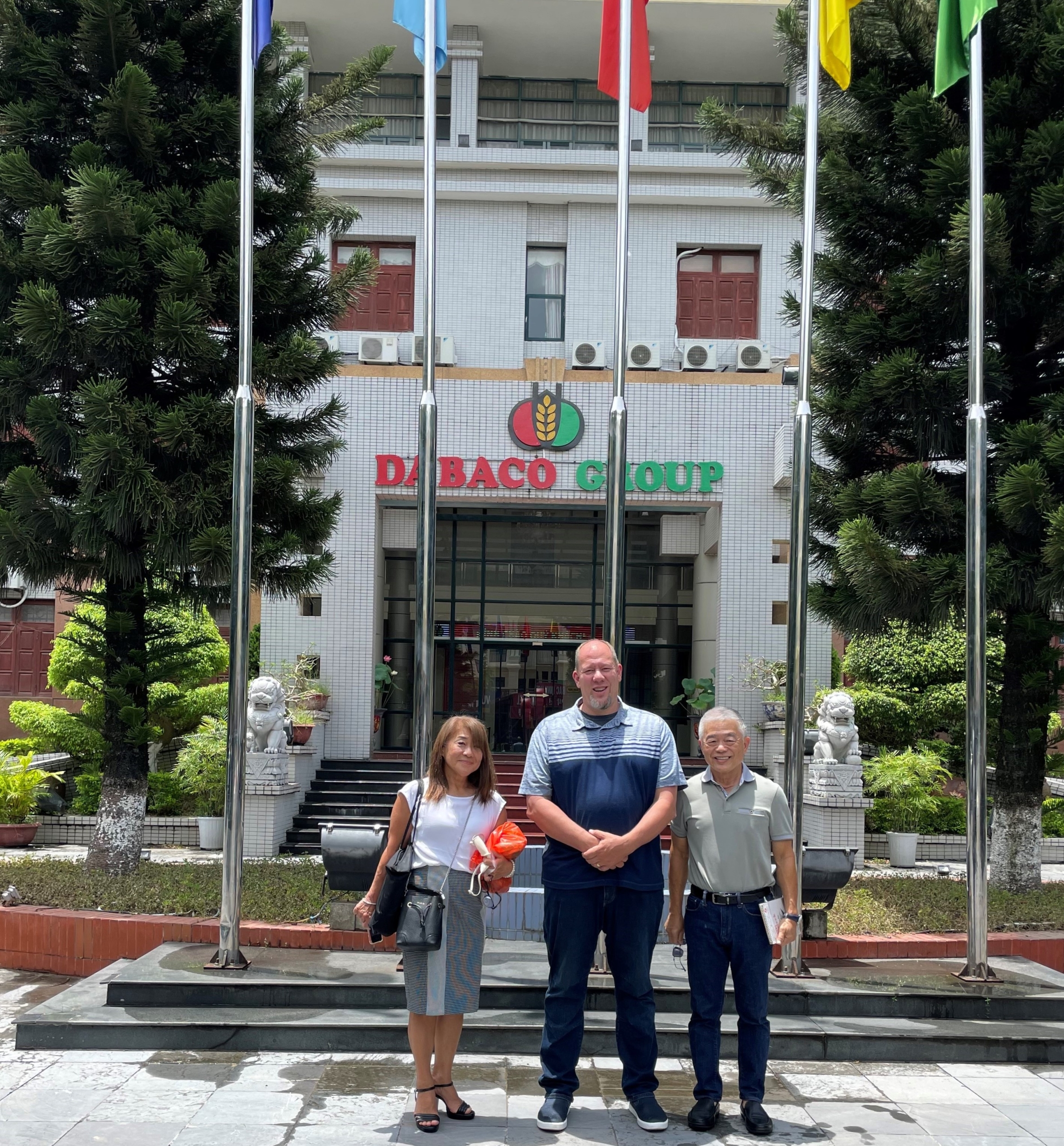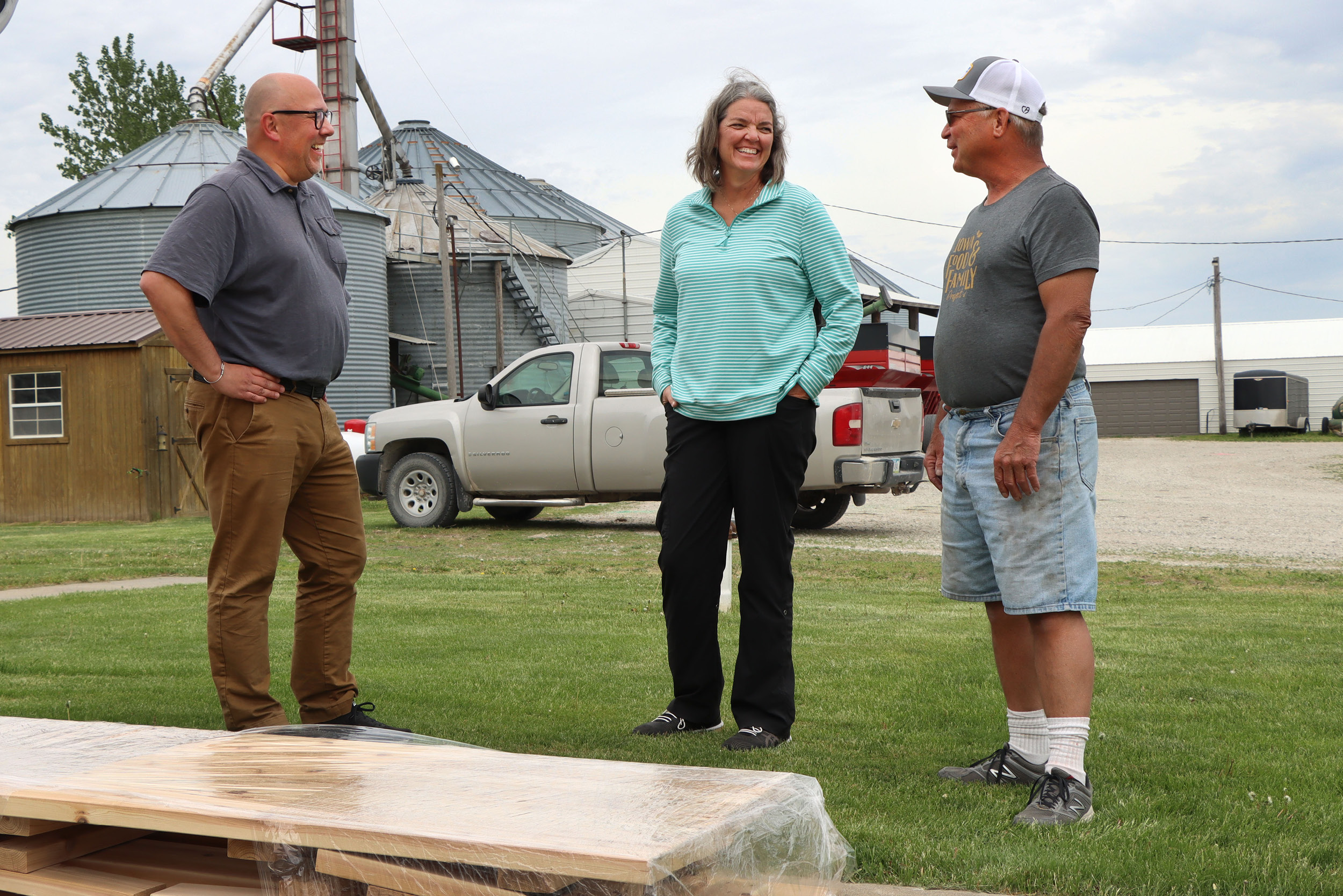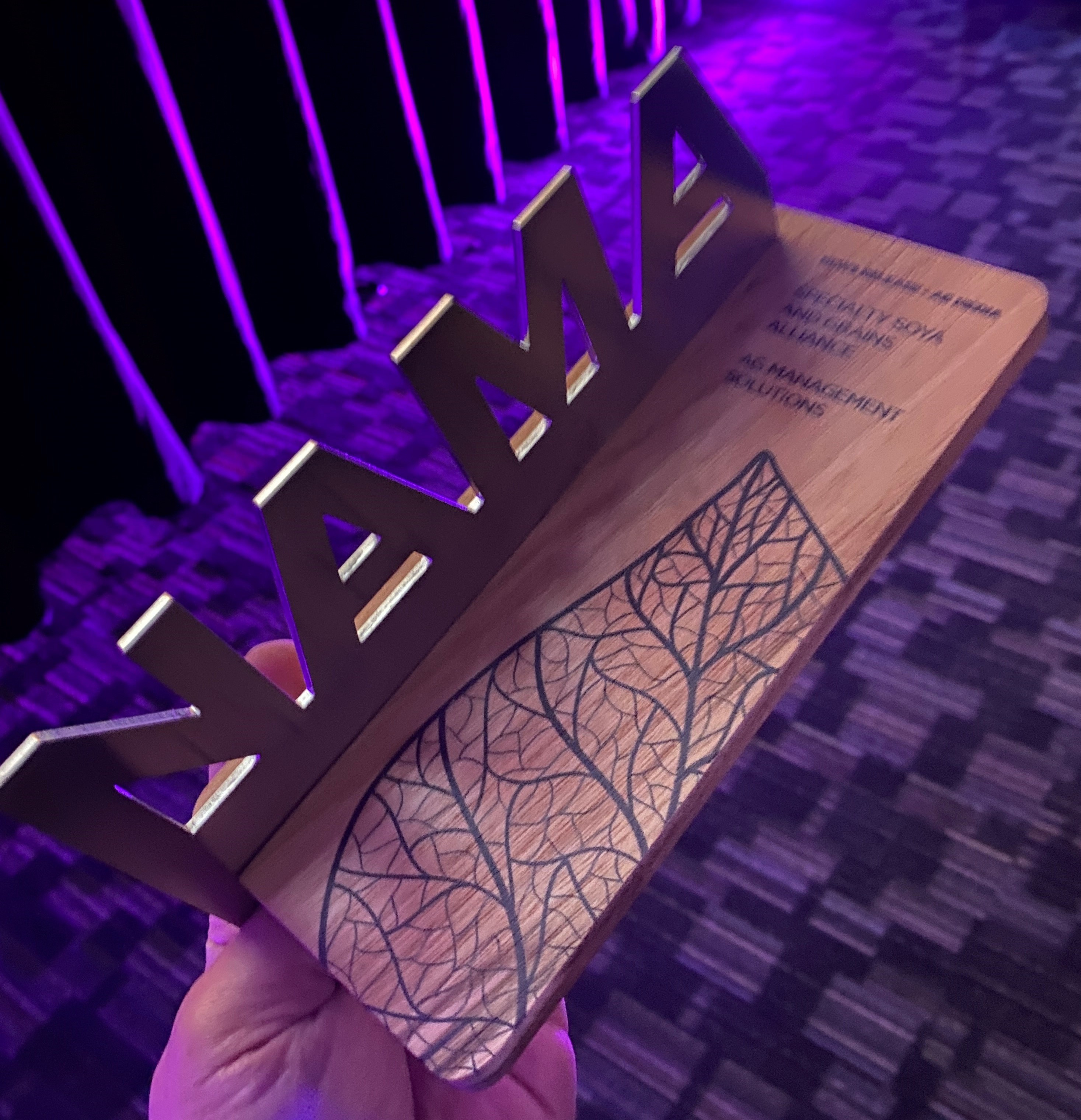For Yan Small, specialty soybeans grown and processed in Minnesota are perfect for her tofu.
Sure, they’re conveniently located, as her business, MinnTofu, is based in the heart of the North Star State. But, she says, “there’s something about the soybeans here.”
Speaking to an international trade team during the Specialty Soya and Grains Alliance’s “Fork to Farm” event at the historic Oliver Kelley Farm in Elk River, Minnesota, on June 10, Small showed off her locally sourced, handmade tofu and soymilk products, talked about the growth of her young tofu and sprouts businesses and touted the beans that go into them.
Attendees sampled air-fried tofu cubes with various sauces, along with chocolate and strawberry and unflavored soy milk or “juice.”
“There’s something about the soybeans here that are very pure,” Small said. “I don’t know why it’s different.”
Small’s message seemed to resonate with the international guests, who were capping a week’s worth of learning about identity preserved soybeans and the procurement of food-grade soybeans from the United States. The trade team, one of the first from southeast Asia to come to the Upper Midwest since prior to the pandemic, included food company representatives from Cambodia, Malaysia, Myanmar, Philippines, Thailand and Vietnam. They spent the first part of the week attending a course at Northern Crops Institute in Fargo, N.D. SSGA was one of the sponsors of the course and was well-represented in its presentations.
The Fork to Farm event, sponsored by the Minnesota Soybean Research & Promotion Council (MSR&PC), included a lunch, as well as opportunities for the trade team to have informal discussions with SSGA-member companies – Grain Millers, SB&B and Scoular – and an identity preserved soybean farmer, SSGA board director Keith Schrader.
Thom Petersen, Minnesota Department of Agriculture commissioner, attended as well, along with deputy commissioner Andrea Vaubel.
“In Minnesota, we have 68,000 farmers and almost 26 million acres of farmland,” Petersen said, “and identity preserved is one of the most exciting things, I think, that has the potential to grow in the coming years.”
Schrader, who raises IP soybeans and non-GMO corn, among other crops, explained the tough, late-spring planting conditions farmers have gone through, along with the transportation issues foreign buyers need to be aware of.
“For me, as a farmer, it means as much to me to get that product to you as it means to you getting the product from us,” said Schrader, who represents MSR&PC on the SSGA board. “We’re looking forward to being able to send you some really high-quality soybeans.”
Afterward, the group moved into the farm’s teaching kitchen for Small’s tofu demonstration and the opportunity to taste her products made from Minnesota soybeans.
“She’s always open to trying new varieties to see if they will improve her product or make her product more consistent,” said Craig Tomera, identity preserved crop specialist at Grain Millers. “She wants consistency, so it’s very important to her that the first batch is the same as the last batch. Using identity preserved, we can find a variety that remains identity preserved and that ensures her that there isn’t going to be any comingling of other varieties that can ruin that texture or flavor for her.”
Earlier in the week in Fargo, the caps and gowns came out, as eight members of a trade team from Myanmar were awarded certificates as “the first graduating class of SSGA University.”
The eight Burmese representatives took online classes from the Specialty Soya and Grains Alliance along with more than 20 others during an event sponsored by ASA WISHH (World Initiative for Soy in Human Health) in May. Those classes were a primer for those who traveled to the United States to participate, along with several other international guests, in NCI’s Food Grade Soybean Procurement Course that began on June 6.
After participants from the Philippines, Malaysia, Indonesia, Vietnam and Cambodia received completion certificates from NCI, there was a surprise for the contingent from Myanmar as SSGA Manager of Strategic Programs Shane Frederick and WISHH Asia Director Alan Poock donned mortarboards and robes and took the stage to present them with their SSGA University certificates, along with their NCI awards.
“This was the first trade team to come to NCI in more than two years, since before COVID,” Frederick said, “and we wanted to make it extra special and a little fun with some pomp and circumstance. Working with our partners at WISHH and NCI and others this week, it was a joy to be around this group that was so eager to learn.”
Besides putting on the SSGA University course for WISHH and Myanmar, SSGA helped recruit other participants to the NCI course. Some of them participated in SSGA’s IP B2B events held virtually in 2021.
During the weeklong course, they heard from, among others, several SSGA-tied individuals and organizations, including Frederick; technical advisers Hoa Huynh, Raquel Hansen and Bruce Abbe; board chairman Rob Prather of Global Processing; board directors Adam Buckentine of The Redwood Group and Bob Sinner of SB&B; past chairman Curt Petrich of HC International; and Tomera of Grain Millers. The group toured SB&B’s facility in Casselton, N.D., as well as Brushvale Seed in Breckenridge, Minn., and visited Scoular’s Minneapolis headquarters.
Besides SSGA and WISHH, the course had the support of MSR&PC, North Dakota Soybean Council and South Dakota Soybean Checkoff.

 Following their visit with Vinasoy, a Vietnamese soymilk and soy drink producer, Huynh believes the prospect of Vinasoy importing U.S. Identity Preserved soybeans to be high. Vinasoy staff recently returned from the Food Grade Soybean Procurement Course at Northern Crops Institute in Fargo, N.D. Prather and Huynh also met with Dabaco, a feed and food production company and have more visits planned.
Following their visit with Vinasoy, a Vietnamese soymilk and soy drink producer, Huynh believes the prospect of Vinasoy importing U.S. Identity Preserved soybeans to be high. Vinasoy staff recently returned from the Food Grade Soybean Procurement Course at Northern Crops Institute in Fargo, N.D. Prather and Huynh also met with Dabaco, a feed and food production company and have more visits planned. Last week, Ryan got his table, as SSGA hand delivered it to him, driving it down from Mankato, Minnesota.
Last week, Ryan got his table, as SSGA hand delivered it to him, driving it down from Mankato, Minnesota. SSGA received the award in the News Release – Ag Media category for its October 2020 press release that was one of the first sound the alarm on the container shipping and global supply chain crisis. The release,
SSGA received the award in the News Release – Ag Media category for its October 2020 press release that was one of the first sound the alarm on the container shipping and global supply chain crisis. The release,  SSGA is grateful for Abbe’s service as it has grown into a national business organization.
SSGA is grateful for Abbe’s service as it has grown into a national business organization. The event was held in coordination between SSGA, the U.S. Soybean Export Council (USSEC) and the China Chamber of Commerce of Import and Export of Foodstuffs, Native Produce and Animal By-Products (CFNA).
The event was held in coordination between SSGA, the U.S. Soybean Export Council (USSEC) and the China Chamber of Commerce of Import and Export of Foodstuffs, Native Produce and Animal By-Products (CFNA).

